

20 Pros and Cons of Airplanes
Pros And Cons Of Airplanes
Imagine soaring through the vast skies, leaving behind the hustle and bustle of everyday life on the ground. Like a bird in flight, airplanes offer a captivating experience that allows you to traverse great distances with unparalleled speed and efficiency.
From the moment you step onto an aircraft, you are transported into a world of convenience and accessibility, where distant destinations become within reach. However, like any mode of transportation, airplanes come with their own set of pros and cons.
In this article, we will explore the advantages and disadvantages of airplanes, shedding light on their economic impact, environmental considerations, safety measures, health factors, and cost implications.
Whether you’re a frequent flyer or someone curious about air travel’s trade-offs, read on to discover how planes can both elevate your journey and pose challenges along the way.
Table of Contents
Pros of Airplanes
- Speed of Travel: Airplanes are one of the fastest modes of transportation available to humans. They can cover vast distances in a relatively short amount of time, making international travel feasible within hours. For instance, a trip from New York to Paris, which might take days by ship, can be accomplished in under 8 hours by an airplane.
- Global Connectivity: Airplanes have played a pivotal role in shrinking our world. They’ve made it feasible to maintain personal and professional relationships across continents. The existence of frequent flights connecting major cities globally ensures that businesses can operate on a global scale.
- Safety: Contrary to some beliefs, air travel is one of the safest modes of transportation. The design and engineering of airplanes, rigorous training of pilots, and strict oversight by aviation authorities all contribute to a high safety record. For instance, the construction of an airplane includes multiple redundancies in systems to ensure continued operation even in the face of malfunctions.
- Cargo Transportation: Airplanes aren’t just crucial for moving people. They’re vital for the rapid movement of cargo, especially perishable goods and essential medical supplies. Quick transportation ensures that items like fresh produce or vital medicines reach their destinations while still effective or fresh.
- Innovative Engineering: The principles behind airplane design and aviation have spurred countless advancements in technology and engineering. The need for efficient, lightweight materials, for instance, has led to innovations in metallurgy and materials science.
- Economic Impact: The aviation industry is a significant contributor to the global economy. It creates millions of jobs directly and indirectly – from airline staff and pilots to the tourism sector that thrives because of air travel.
- Flexibility of Design: As mentioned in the background, airplanes come in a variety of sizes, shapes, and wing configurations. This flexibility allows for different types of aircraft to be designed for specific roles, whether it’s a large passenger airliner, a cargo plane, or a small bush plane.
- Physical Comfort: Airplanes, especially long-haul ones, offer comforts like sleeping areas, entertainment systems, and meals. The enclosed fuselage offers protection from weather conditions, ensuring that passengers can travel in comfort regardless of external weather.
- Stimulating Tourism: Many tourist destinations worldwide rely heavily on airplanes to bring in visitors. Islands or remote areas, which might be inaccessible or less appealing due to long travel times by other means, become attractive destinations due to the speed and convenience of air travel.
- Emergency Responses: Airplanes play a critical role in emergency situations. They’re used to quickly transport medical patients, deliver emergency supplies, or evacuate people from danger zones, ensuring timely interventions in life-threatening situations.

Cons of Airplanes
- Environmental Impact: Air travel contributes to greenhouse gas emissions. The burning of jet fuel releases carbon dioxide into the atmosphere. Although the aviation industry is making strides in developing more fuel-efficient engines and considering alternative fuels, the current environmental footprint remains significant.
- Noise Pollution: Airports, especially those near residential areas, can be sources of significant noise pollution. The sound of takeoffs and landings can be disruptive to communities living nearby and can negatively impact the quality of life.
- Cost: Flying can be expensive. Ticket prices, especially for international flights or during peak seasons, can be prohibitive for many people. Moreover, the increasing costs associated with aviation fuel and maintenance can translate to higher ticket prices for consumers.
- Security Concerns: Due to the potential threats associated with air travel, rigorous security protocols have been implemented in airports around the world. While necessary for safety, these protocols can also be time-consuming, invasive, and stressful for travelers.
- Risk of Delays: Numerous factors, like weather conditions, technical issues, or air traffic, can lead to flight delays. These delays can disrupt travel plans, lead to missed connections, and create overall inconveniences for passengers.
- Limited Luggage: Air travel often comes with strict baggage allowances. Travelers might face additional charges for extra luggage or might have to leave some items behind due to weight and size constraints.
- Potential for Health Issues: Long-haul flights can pose health risks like deep vein thrombosis. The cabin pressure and dry air can also be uncomfortable for some passengers, leading to dehydration or discomfort.
- Dependency on Infrastructure: Airplanes rely heavily on well-maintained infrastructure like airports, runways, and air traffic control systems. Developing countries or remote areas might lack the necessary infrastructure, limiting the reach and benefits of air travel.
- Limited to Specific Locations: Airplanes need airports to operate. This means they cannot serve every location, especially remote or rugged areas without the necessary landing infrastructure. This limits the accessibility of certain areas by air.
- Fear and Phobia: A significant portion of the population has a fear of flying, known as aviophobia. This fear can limit their travel options and make air travel a stressful experience, even though, statistically, it’s very safe.
Speed and Efficiency of Travel
You’ll find that one of the major advantages of airplanes is how quickly and efficiently you can travel from one destination to another.
With airplanes, you can save a significant amount of time compared to other modes of transportation. Whether it’s a domestic or international flight, airplanes allow you to reach your destination much faster than driving or taking a train. This time savings is especially important when you have limited vacation days or need to attend important business meetings in different cities.
Additionally, airplanes provide global connectivity, allowing people to easily access destinations all over the world. No matter how remote or far-flung a location may be, airplanes can take you there swiftly and effortlessly, opening up countless opportunities for exploration and adventure.
Convenience and Accessibility
With airplanes, it’s incredibly easy to travel to remote destinations that would otherwise take days or weeks to reach. The convenience and accessibility of air travel cannot be overstated.
Unlike other modes of transportation, airplanes allow you to bypass the congestion and noise pollution often associated with crowded cities and highways. Instead, you can soar above it all, enjoying a smooth and comfortable journey to your destination.
Additionally, air traffic control ensures that flights are coordinated efficiently, minimizing delays and maximizing convenience for passengers. Whether you’re heading on a business trip or a vacation, airplanes offer unparalleled convenience and accessibility, allowing you to quickly and easily reach even the most remote corners of the world.
Economic Impact
If you’re interested in learning about the economic impact of airplanes, there are two key points to consider.
Firstly, airplanes have a significant boost to tourism and local economies. With the ability to travel quickly and easily, tourists can visit new destinations and spend money on accommodations, dining, and attractions.
Additionally, the aviation industry itself creates numerous job opportunities, from pilots and flight attendants to ground crew and maintenance workers.
Boost to Tourism and Local Economies
Enhancing tourism and boosting local economies, airplanes provide a convenient and efficient means of transportation. The economic growth generated by increased tourism can have a profound impact on local communities.
When tourists visit new destinations by airplane, they spend money on accommodations, meals, attractions, and souvenirs, injecting funds directly into the local economy. This influx of tourist dollars supports local businesses and creates jobs for residents.
Additionally, airplanes foster cultural exchange as tourists from different parts of the world are able to explore new cultures and traditions. This exchange of ideas and experiences promotes understanding and appreciation among diverse groups of people.
Overall, airplanes play a crucial role in driving economic growth and facilitating cultural exchange, making them an essential tool for boosting tourism and benefiting local economies.
Job Creation in the Aviation Industry
Imagine yourself soaring through the skies, your career taking flight in the aviation industry, where job opportunities abound and passion meets innovation.
The aviation industry is a major source of job growth, providing employment for millions worldwide. From pilots to mechanics, engineers to air traffic controllers, there are countless roles available that require specialized skills and expertise.
Working in this dynamic field not only offers competitive salaries but also opportunities for skills development and advancement. Whether you aspire to be a pilot navigating the skies or an engineer designing cutting-edge aircraft, the aviation industry fosters a culture of continuous learning and professional growth.
With advancements in technology and increasing global connectivity, the demand for skilled professionals in this industry is projected to continue rising, making it an attractive choice for individuals seeking rewarding careers with room for progression.

Environmental Impact
Did you know that airplanes have a significant impact on the environment? While they provide convenience and speed for travel, airplanes also contribute to carbon emissions and noise pollution. Here are some of the environmental effects caused by airplanes:
- Carbon emissions: Airplanes release large amounts of carbon dioxide and other greenhouse gases into the atmosphere, contributing to global warming and climate change.
- Noise pollution: The noise generated by aircraft engines can be disruptive to both humans and wildlife, affecting their health and behavior.
- Air quality: Aircraft exhaust contains pollutants such as nitrogen oxides and sulfur dioxide, which can degrade air quality near airports.
- Ozone depletion: Certain aircraft emit chlorine-containing compounds that contribute to the depletion of the ozone layer.
- Wildlife disruption: The construction of airports can disrupt natural habitats, leading to habitat loss for various animal species.
It’s important to consider these environmental impacts when evaluating the pros and cons of airplane travel.
Safety and Security
Traveling by plane offers a sense of security and safety that cannot be matched by other modes of transportation. Aviation regulations and passenger screening play a crucial role in ensuring the safety of air travel. Airplanes are subject to strict regulations set by aviation authorities, which cover everything from maintenance standards to pilot training requirements. These regulations help to ensure that airplanes are built and operated in a safe manner.
Passenger screening is another important aspect of airplane safety. Before boarding a flight, passengers go through various security checks, including metal detectors, X-ray scanners, and body pat-downs if necessary. These measures are in place to identify any potential threats or prohibited items that could jeopardize the safety of the aircraft and its occupants.
Incorporating a table can further highlight the importance of aviation regulations and passenger screening:
Overall, airplanes prioritize safety through stringent aviation regulations and thorough passenger screening processes.
Health Considerations
When it comes to your health, it’s important to consider the impact of air travel on your well-being. Airplanes can have both positive and negative effects on your health. Here are four key things to keep in mind:
- Impact on Respiratory Health: The recycled air in airplane cabins can be dry, leading to dehydration and dryness in your nose and throat. This can make you more susceptible to respiratory infections.
- Effects on Circadian Rhythm: Crossing different time zones during long flights can disrupt your body’s internal clock, causing jet lag. This can result in fatigue, difficulty sleeping, and digestive issues.
- Exposure to Germs: Being in close proximity to other passengers increases the risk of contracting illnesses like colds or flu.
- Deep Vein Thrombosis (DVT): Sitting for long periods during flights can increase the risk of blood clots forming in the legs.
Considering these factors, it’s essential to take steps such as staying hydrated, moving around regularly during flights, and practicing good hygiene to mitigate potential health risks associated with air travel.
Cost and Affordability
Now that we’ve discussed the health considerations of air travel, let’s dive into the cost and affordability aspect.
When it comes to airplanes, a key factor to consider is the cost analysis. While flying can be an efficient way to cover long distances quickly, it often comes at a hefty price tag. However, there are ways to make air travel more budget-friendly.
Many airlines offer discounted fares for early bookings or during off-peak seasons. Additionally, opting for economy class instead of business or first class can significantly reduce costs. Another option is to join frequent flyer programs or use credit cards with airline rewards to accumulate points and save on future flights.
By carefully planning your trips and being mindful of your expenses, you can enjoy the convenience of flying without breaking the bank.
Frequently Asked Questions
What are the average ticket prices for airplane travel.
On average, ticket prices for airplane travel can vary depending on factors such as destination and season. Budget airlines often offer lower fares, making it a more affordable option for travelers.
Are there any health risks associated with long flights?
Long haul flights can pose health risks, like deep vein thrombosis (DVT). It’s important to be aware of these dangers and take precautions, such as moving around and stretching during the flight.
How do airplanes affect the local economy of cities where airports are located?
Airplanes have a significant impact on the local economy of cities where airports are located. Airport development leads to job creation, as it requires staff for operations, maintenance, security, and other related services.
Can airplanes contribute to climate change?
Yes, airplanes can contribute to climate change through their environmental footprint. Emissions from burning fossil fuels during flights release greenhouse gases, contributing to the warming of the planet and causing climate change.
What measures are in place to ensure the safety of passengers and prevent terrorism on airplanes?
To ensure your safety and prevent terrorism on airplanes, rigorous security measures are in place. These include thorough passenger screenings, advanced surveillance technologies, and trained staff who constantly monitor for any potential threats.
Related posts:
- Pros and Cons of Flight Attendants
- Pros and Cons of Becoming a Pilot
- Pros and Cons of Being a Pilot
- Pros and Cons of Naca
- Pros and Cons of Smart Traveler Enrollment Program
- Pros and Cons of Hydrogen Peroxide Water Treatment
- 20 Pros and Cons of Airline Deregulation
- Pros and Cons of Unemployment Insurance
- 10 Pros and Cons of Home Rule
- 20 Pros and Cons of Color Guard
- 20 Pros and Cons of Hydro Dipping
- 20 Pros and Cons of Dutch Lap Siding
- What Is a Buffer Zone in Real Estate?
- Pros and Cons of Retesting Elderly Drivers
- Pros and Cons of Life360
- Pros and Cons of Migrating Nest to Google
- 20 Pros and Cons of Cowhide Rugs
- 20 Pros and Cons of Lockers in School
- 20 Pros and Cons of Halfway Houses
- Pros and Cons of 1099 Employment
Jordon Layne

Travel Tips and Trivia
Last Updated: January 23, 2024
The Must-Know Advantages and Disadvantages of Air Transport for Travellers
Want to know the primary advantages and disadvantages of air transport for travellers to keep in mind? Ther’re all here! Check out this piece to find out more.
Danny Newman
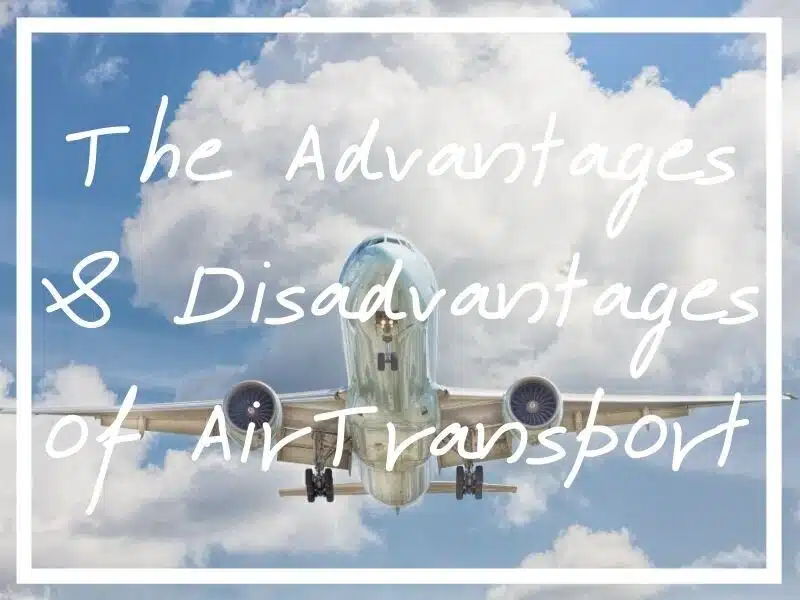
Keep reading for all of the advantages and disadvantages of air transport to think about before booking you flights!
Air travel’s the go-to form of transportation for most travellers.
If you want to travel the world, then you hop on a plane, right?
Watch a few films, fall asleep for a few hours, eat some questionable food, and, before you know it, you’ve travelled half way around the world.
Clearly, there’s a host of advantages of air transport to enjoy. Alas, there’s a fair number of disadvantages of air transport for travellers to consider too.
In this post I’d like to detail them all!
Keep reading to learn about the advantages and disadvantages of air transport to keep in mind before booking your flights.
Heads up, this post contains affiliate links.
The Advantages of Air Transport- Airplane Advantages!
Let’s start with the good stuff.
Like I said in the intro, travelling by plane offers a host of pros to travellers. Here is a selection of the primary advantages of airplanes that you’ll enjoy.
(Travelling by car instead?! Here are the pros and cons of car transport to think about too!)
1. The Ease (Top Advantages of Airplanes)
It’s hard to deny the ease and simplicity that comes from travelling by air.
Okay, so the experience at the airport can be a little stressful sometimes.
But, all things considered, stepping onto a plane allows you to travel around the world in a matter of hours.
To put things into perspective, it takes around 12 hours to drive the length of the UK. In that same length of time I could fly from London to Thailand!
It’s so straight-forward that you can take it for granted.
I try and pinch myself whenever I’m on a plane these days in an attempt to remind myself how incredible the process actually is.
2. The Experience (Another of the Main Advantages of Planes)
The experience of air travel is one of the greatest airplane advantages.
Travelling by plane suspends you thousands of feet above the earth in a glorified metal tube with wings.
That’s noteworthy in and of itself!
Then there’s the actual beauty of looking out at the world from 30,000 feet. Seeing everything from above is always special- the clouds, the colors, the sunsets, and stars…it’s hard not to be blown away by it.
And, at the end of it all, you walk off the plane and get to enjoy a brand new culture and country.
Travelling by aeroplane offers an unparalleled experience.
You might like this post about how to entertain a toddler on a plane too! Check it out!
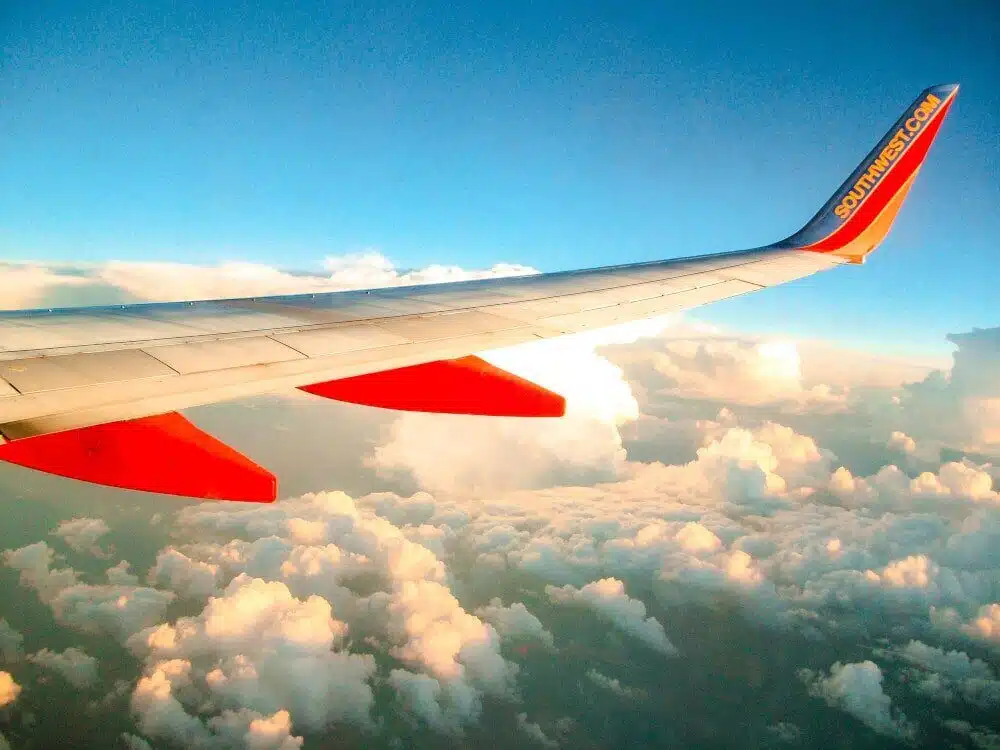
The experience of air travel, and the beauty on offer are primary advantages of air transport to enjoy.
3. The Novelty of Air Transportation
Everything about the experience is novel in nature.
Even if you fly regularly, the vast majority of life is spent looking up at the sky, rather than down at the ground. Flight provides a new perspective that can feel like a break from time itself.
Most travellers are on the hunt for adventure, of which novelty is a key component.
Nothing ordinary feels adventurous! Of course, travelling by plane has become so common these days that it’s sort of been normalized.
Even so, for me, the novelty involved with air transport always contains elements of adventure in it. I can’t help but feel giddy with excitement as we line up on the runway.
4. The People (Primary Pros of Airplanes- On Occasion!)
Solo travellers are unable to choose their seat-neighbours on planes.
Obviously, that’s not always a good thing…
However, sometimes it works out amazingly well. I’ve met some awesome people on planes, all with cool stories and friendly faces.
These chance encounters can have unexpected effects. You might find a travel companion, a night’s accommodation, a free ride from the airport…or just someone to pass the time with.
5. The Price (Primary Importance of Air Transport for Budget Travellers!)
Flights aren’t always cheap.
But they definitely can be. In fact, I’m often blown away by the discount tickets on offer from budget airlines. I remember flying from the south of France back to England for 10 bucks once!
How some of the companies make any money I have no idea.
It’s the price of air travel that compels most of us to use it. For some reason it’s cheaper than more environmentally friendly forms of transport, like trains.
Bound by a backpackers’ budget, how could you not go for the discount flight? Combine that with the ease involved and adhering to ethical values can be a challenge!
Even longer flights with standard airlines seem inexpensive when you consider how far you’re travelling.
In the grand scheme of things, a few hundred dollars spend on crossing the planet seems like a fair deal.

The ability to travel across the world without lifting a finger is another immense advantage of travelling by aeroplane,
6. The Rush
This won’t apply for everyone…
But there’s a definite rush that comes from flying as well.
I mean, you might die. There’s nothing like the prospect of a hot and fiery demise from height to get the adrenaline pumping.
It’s hard not to feel a rush when the engines roar and the plane hurtles down the runway for take-off. It’s like being on a rollercoaster that’s taking you to foreign lands.
Equally, there’s something primal about the desire to fly. I reckon people have looked up at the sky and wished they could fly like a bird since the dawn of time, Nowadays, we’re lucky enough to actually experience it.

7. The Adventure
I see air transport as a form of gatekeeper to adventure.
It opens the door to new cultures and countries; to new experiences in distant lands. Beyond the airport terminal lays the adventure you’ve been dreaming of and planning for months.
For that, I find the prospect of going to airports and travelling by plane endlessly appealing. I don’t mind queueing up for security, being manhandled in the body search, or waiting for hours for a delayed flight.
There’s just something exciting about being there. I know that it’s taking me where I want to go.
8. The Time
A final advantage of air transport is the time involved.
I’ve already noted the relative brevity involved with covering long distances.
Here, I’m talking about the chance to have some time to yourself. Life is so often lived in a frenetic way. How regularly do you get 12 hours (or however long) to just sit, watch movies, drink free booze, and read your book?
For most people it’s rare.
Yet on a plane you’re forced into it! Embrace the opportunity to get a chance to rest up and chill out.
Heads up, you might also like this post about the pros and cons of water transport!
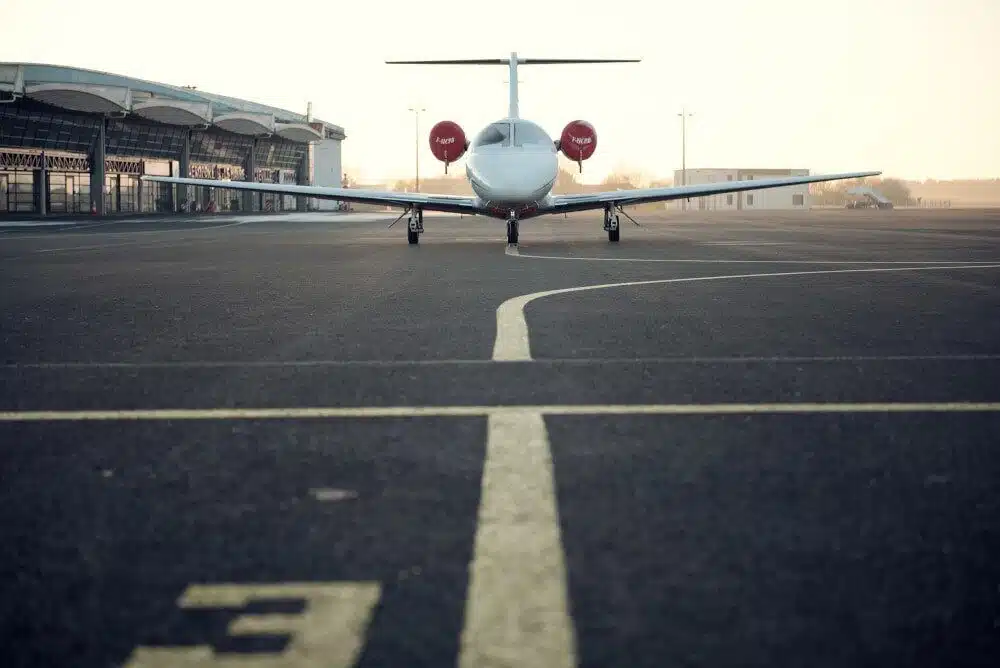
Onto the disadvantages! Here are a selection of cons of travelling by aeroplane to think about.
The Disadvantages of Air Transport- Airplane Disadvantages!
Onto the cons of travelling by plane. Here are all the disadvantages of air transport to think about before booking your flights.
1. The Risk of Delays, Cancellations, and Lost Baggage
All sorts of things can go wrong when you book yourself a flight.
For instance, not so long ago, I booked myself a domestic flight from Da Nang to Ho Chi Minh (both in Vietnam), from where I had a second flight booked to Dubai. Those two flights were on separate tickets, which meant I had to get to Ho Chi Minh on time.
As Sod’s Law had it, I turned up at Da Nang airport to find that my plane to Ho Chi Minh was delayed for hours. If I waited for it, I’d be late to HCM.
Great. With no other option, I went to the counter to book a seat on an earlier flight instead. There was solitary one seat on one final flight available that’d get me to HCM in time for my ongoing trip to Dubai.
Have a guess where it was…
Business-class .
As a budget traveller, forking out ten-times more cash than I’d have paid for economy class wasn’t fun. Thankfully it was only a short flight! I paid the money, got on the flight, enjoyed my fancy seat, and arrived in HCM with time to spare.
Only to find that my plane to Dubai was delayed anyway and I could’ve waited for my first flight out of Da Nang after all!
Luck was against me that day. However, this is just one example of the issues you can face with flying.
Flights get delayed and cancelled all the time ! Bags get sent to the wrong place, damaged in transit, or lost altogether. And travellers are forced to wave goodbye to their carefully laid plans (not to mention hundreds/thousands of dollars spent on tickets) in the process.
My top tip for avoiding these kinds of airplane issues, accidents, and inconveniences?
Get yourself some high-quality travel insurance.
I never go away without it for these exact reasons. You just never know when something’s going to upset your plans and stretch your bank balance.
Sure, insurance can’t prevent the bad stuff from happening. But it will relieve the practical and financial implications if it does.
As much as anything else, though, travel insurance gives you peace of mind. Even if you never need it, you know it’s there- just in case you get unlucky.
It makes the whole process of handling flight-related frustrations a little less stressful.
I use and highly recommend World Nomads . They’re a popular choice among travellers (myself included) and provide all the cover you could ever need.
Check them out below to get an instant quote.
2. The Ease
So, yes, the ease involved with air transport is a great thing.
But I think it’s a bit of a double-edged sword.
I find that the ease involved can make it harder to appreciate the final destination. It’s like being given a reward for something you didn’t suffer for, or winning a race against no competitors.
We always value things for which we’ve worked and suffered.
Think about reaching the summit of a mountain, or getting top grades in school. It’s hard work, but the result justifies it and feels even more gratifying in the process.
Stepping off a plane into a brand new environment after 10 hours of sitting, eating and watching films lacks that elements of hardship. It’s like you haven’t earned the reward.
3. The Speed
Another issue I have with air transport is the speed with which you arrive at your destination.
Now, the speed you travel at is obviously tied up with the ease of air transport. However, as nice as it is, crossing the globe in a matter of hours can be discombobulating too.
A wise older friend of mine told me a proverb once, which (to paraphrase), says that when your body travels large distances, it always takes your soul a while to catch up.
For me, this sums up the feeling of discombobulation I have after a long journey by aeroplane. It was just too easy! How can I be in this brand new beautiful place having done and suffered nothing?
Sometimes, upon arrival in a new place, I can feel a bit flat and disinterested for the first few days, which is the exact opposite of how I expect to feel.
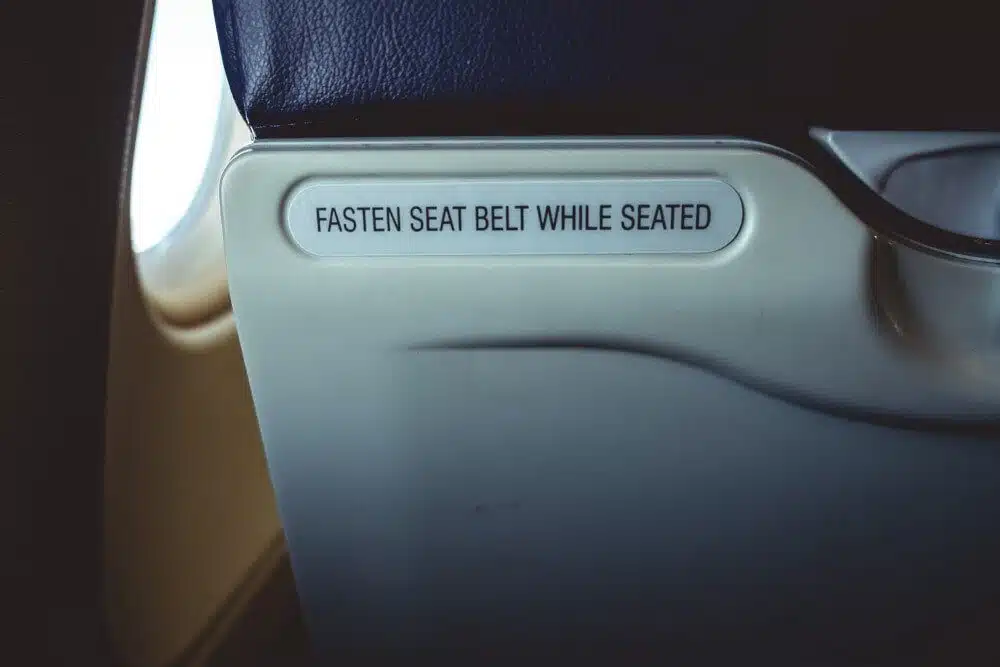
The lack of space on a flight can be both a real and figurative pain in the arse. For anyone in cattle class, it’s definitely one of the main disadvantages of travelling by plane.
4. The Environmental Impact
It goes without saying that planes are rubbish for the environment.
They dump enormous amounts of carbon dioxide into the air, which is the exact opposite of what we should be doing to avert global warming.
Greeny or not, try not to take air travel lightly, and try to do carbon offsetting where you can.
5. The Noisy Neighbours
Like I said above, the people you meet on a plane can make the journey far more enjoyable.
Alas, that isn’t always the case.
- We’ve all been sat next to enormous neighbours who seem to spread their girth onto our seat too.
- We’ve all had thickset people unfairly take up our arm-rest.
- We’ve all had the annoying child sat behind us, incessantly kicking our seat.
- We’ve all had the baby who won’t stop crying, and the drunk who won’t stop talking.
And so on. Bad seat-neighbours can make for a tough time of things on long flights.
6. The (Lack of) Space
I get fidgety on flights.
It feels like Christmas come early whenever I chance upon empty flights with spare seats to stretch out upon. By contrast, a lack of leg room, middle seats, and/or large seat-neighbours do more than cramp my style.
It’s actively uncomfortable, and makes sleeping a challenge.
I get cranky.

Fear factor is often top of the list of all disadvantages of air transport.
7. The Fear
I used to hate flying.
I was terrified of it!
Thankfully, the fear has eased up the more I’ve done it. Nonetheless, there are times when my heart still lurches into my mouth.
For people afraid of flying, the prospect of hours on a plane can be enough to dissuade them from even taking the journey. Air transport’s never fun when fear’s a factor.
8. The Food
Finally, the food!
Aeroplane food has a reputation for gnarly in-flight meals. However, I actually think it’s got a lot better in recent years. Long haul flights on decent airlines offer tasty meals as standard.
That said, there’s almost always something to put you off. Whether it’s the dodgy sausage at breakfast, or the gristly steak at dinner, plane food isn’t always appetizing.
Remember the Advantages and Disadvantages of Air Transport
There you have it: the advantages and disadvantages of air transport for travellers to keep in mind.
The advantages of air transport make travelling by aeroplane a mighty privilege. However, it isn’t all positive, and the disadvantages of air transport involved shouldn’t be forgotten.
Wondering about travelling by plane to your next destination? Hopefully, this post has helped you figure out if it’s the right form of transport for you.
Now I’d love to hear from you!
Do you have any aeroplane horror stories? Let me know in the comments! And be sure to subscribe to the blog for more posts like this too.
Sharing is caring! Give this post full of the advantages of airplanes a pin!

Share these pros of airplanes (and the cons) with others! Give it a pin!
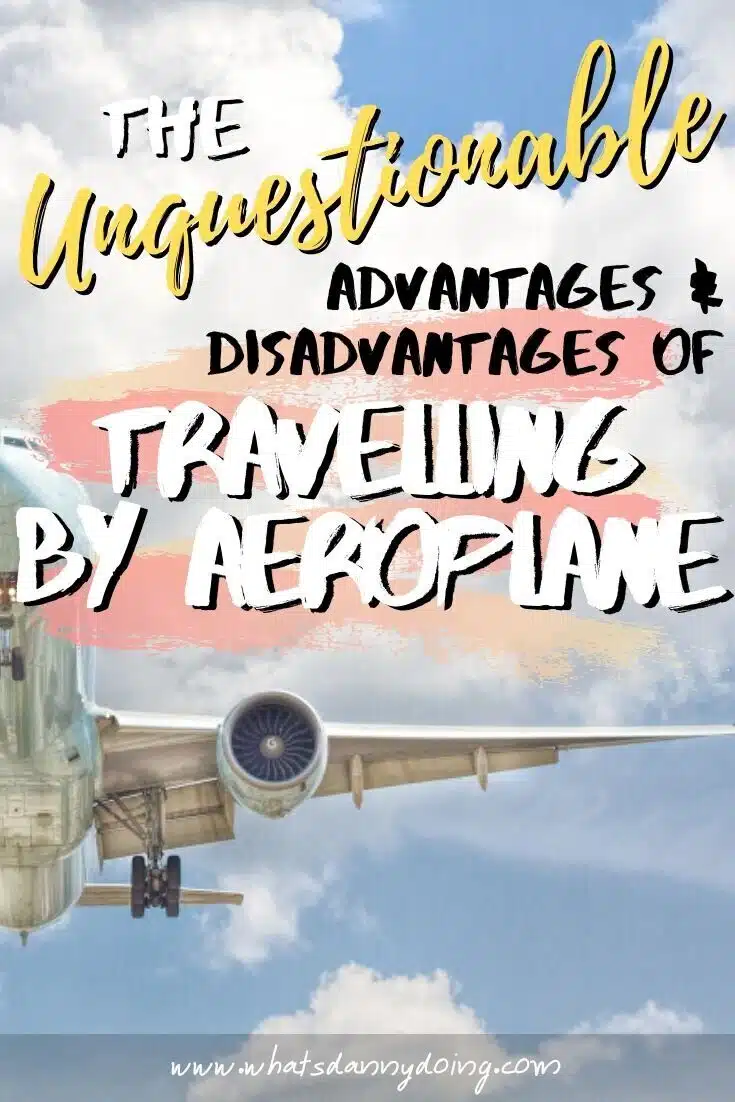
Like this post full off the advantages of air transport? Share it!
Top 6 Advantages and Disadvantages of Air Transport
Table of contents, advantages and disadvantages of air transport.
The most recent mode of travel is air transport. In almost all the countries worldwide, the two world wars provided a big boost for the growth of air transport. Air transport’s unusual feature is that a particular surface track is not needed for its operations.
If your consumers need to move their products outside of Country, price is not the only consideration to be taken into account in selecting the best partner to collaborate with. Many other important factors will allow you to determine whether or not each foreign freight forwarder has the ability to meet the demands of your clients, for example, the urgency of delivery and the mode of transport requested.
Today the technology has made significant progress that ensures a profitable and totally secure air system.
Air transport is one of the ways to move goods that have been very common in recent years when it comes to speed and distribution protection. We discussed beforehand the characteristics and benefits of transport methods, such as land or water, and in this step we will concentrate on the key air benefits. Advantages and Disadvantages of Air Transport is the most asked question in Logistics Landmark. Let’s Discuss.
You may be interested in our blog: Top 10 Advantages and Disadvantages of Road Transport in India
Advantages of Air Transport
1. high speed.
Air is the type of freight capable of traveling long distances in short periods of time. This makes this model an optimum choice if the client has an urgent need to ship a product or if their freight demands special standards of protection or acclimation. It is the quickest transport mode and is therefore ideal for long-distance transport of goods. It takes less time.
2. Fast Service
Air transportation offers convenient, reliable and fast services of transport. It is considered the cheapest way to ship peregrinated goods. It offers a standard, convenient, reliable and fast service.
3. Send almost everywhere your freight
In regions that are not readily accessible to other modes of transport, air transport is considered to be the only means of transport. Open to all regions, irrespective of land interference. A vast network of airlines covering nearly the whole globe is available for many airlines. This ensures that the package can be sent almost anywhere.
4. High Standard of Security
High standard of protection with a low risk of robbery and injury. Shipping by air has a high degree of security since airport safety restrictions on cargo are strictly enforced. Tightly controlled airport controls also minimise cargo theft and loss.
5. Natural Route
An aircraft can fly to any location without seeing any natural obstacles or barriers. Since customs formalities are easily compiled. It eliminates the need for more time to seek clearance. Air travel is used for relief operations during earthquakes, floods, accidents, and famines.
6. There is less need for heavy packaging
Air exports, in general, entail less hard packaging than ocean shipments. This ensures you save both time and money by not having to provide extra packaging services.
Disadvantages of Air Transport
Climate conditions that are adverse: Extreme weather will cause planes to be grounded and airports to close, halting shipments for several days and rendering the service ineffective.
Air travel is the riskiest mode of transport, since there can be considerable losses to goods, customer and crews as a result of a minor crash. Compared to other means of travel, the risks of collisions are higher.
Air travel is considered to be the most expensive means of transportation. The cost of maintaining aircraft is higher and the costs for the building of aerodromes and avions are much higher. That’s why air travel is so expensive that it gets beyond ordinary people’s grasp.
3. Some Product Limitation
There is a whole variety of materials not suitable for such products, from explosives, gases, batteries, fired solids and liquids, which cannot be shipped by air to name but a few.
4. Capacity for Small Carriage
The aircraft have no room and therefore are not ideal for carriage of voluminous and cheaper materials. As is seen for rails, the load volume cannot be raised.
5. Enormous investment
Air travel calls for enormous spending in aerodrome building and servicing. It also calls for professional, qualified and qualified staff that need a significant investment.
- Best 10 Road Tranportation Companies In India
- Eco-Friendly Transportation – Reducing Carbon Emission In Logistics Industry 2020
- 5 Essentials in a Package Tracking Solution
- Effective Logistics Management- 6 Important Tips
- Huntsville Business Journal
- Design Buzz
- Spiritual Pentacle
What do I know before flying my goods?
Since each aircraft has different requirements and restrictions, you must be extremely particular about the amount of the shipment as well as the general characteristics of the aircraft that will carry it.
Find out the location of your goods, the airport where it will fly, and all other details that are relevant to you; this will give you a better understanding of the whole operation.
Understand the features of the commodity you want to sell or import, and decide if air travel is the right choice for you. In certain cases, it may be the only choice, but on others, there may be a larger vision. This blog will help you to understand all the advantages and disadvantages of air transport.
- Africa Logistics Magazine
Powered By 360Presence
Advantages and Disadvantages of Air Transport Advantages and Disadvantages of Air Transport Advantages and Disadvantages of Air Transport
Leave a Replay
Recent posts, what is freight forwarding: meaning, principles & types., what is reverse logistics and it’s benefits and how it works, 10 challenges faced by logistics companies, what is international shipping and how it works, growth of the warehousing industry in india, calculate your freight, sign up for exclusive offers and updates.
Let Us Help You Find a Solution That Meets Your Needs.
Navata Road Transport, a road logistics service provider, established in the year 1982, now occupies a place of pride among the leading Road Transport Organizations in India. Navata is spread across a network of 668 branches in Andhra Pradesh, Telangana, Karnataka, Tamil Nadu, Odisha, Pondicherry, Maharashtra, Gujarat and Madhya Pradesh with ambitious further expansion plans pan India.
OUR SERVICES
- Transportation
- Warehousing
Navata Road Transport D.NO.18-667, BOSE BUILDINGS, KANURU, VIJAYAWADA – 520007 ANDHRA PRADESH.
- 0866-6638787, 9248094455
- [email protected]

IMAGES
VIDEO
COMMENTS
Speed of Travel: Airplanes are one of the fastest modes of transportation available to humans. They can cover vast distances in a relatively short amount of time, making international travel feasible within hours. For instance, a trip from New York to Paris, which might take days by ship, can be accomplished in under 8 hours by an airplane.
1. The Ease (Top Advantages of Airplanes) It’s hard to deny the ease and simplicity that comes from travelling by air. Okay, so the experience at the airport can be a little stressful sometimes. But, all things considered, stepping onto a plane allows you to travel around the world in a matter of hours.
Air travel is the riskiest mode of transport, since there can be considerable losses to goods, customer and crews as a result of a minor crash. Compared to other means of travel, the risks of collisions are higher. 2. Cost. Air travel is considered to be the most expensive means of transportation. The cost of maintaining aircraft is higher and ...